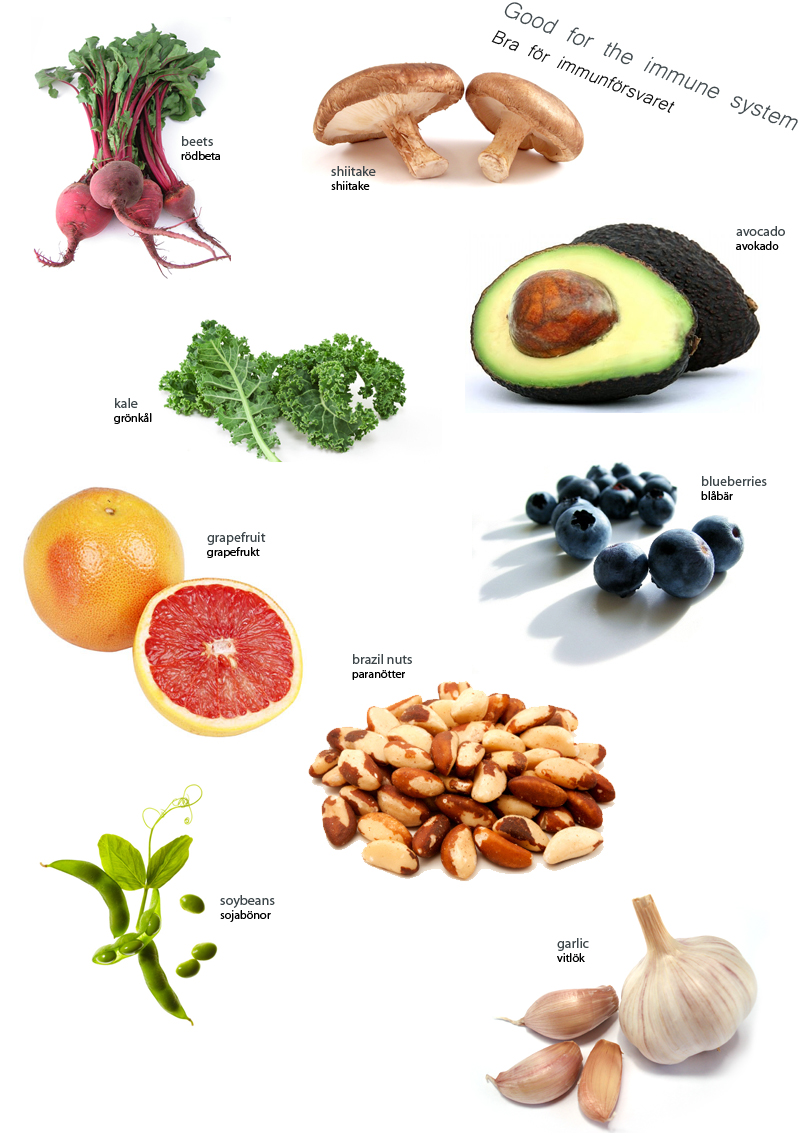The Immune System Part 1
date: 2013-03-23  time: 16:42:00
time: 16:42:00
 time: 16:42:00
time: 16:42:00 The key to good health is an effective immune system that can protect us from colds and cancer, fight food poisoning, relieve allergies and delay the aging process. Poor diet, unhealthy lifestyle and an environment with much pollution can affect and weaken the immune system and make us more susceptible to various diseases - from common colds to more serious infections.
How it works
The immune system acts as a defensive army. It is based primarily in lymphatic and blood, even if the skin and e.g. the digestive system also plays an important role. The lymphatic system is a network of veins which return the fluid - lymph - between the space of the cells and the blood. The lymph nodes, spleen and thymus are also parts of the lymphatic system, where lymphocytes are produced. These cells identify, eliminate and knocks out contaminants, microbes and cancer cells. There are two types of lymphocytes: B-cells and T-cells. T-cells are produced in the thymus and may destroy extraneous cells directly, while the B-cells which are produced in the spleen instead excrete antibodies against the undesirable to destroy it. Natural killer cells are similar to lymphocytes and is particularly effective against cancer cells. The white blood cells in the blood - phagocytes and lymphocytes - play an important role in the immune system by destroying the invading bacteria and removing dead and damaged tissue.
A properly functioning immune system is in perfect balance. Although the immune system's main task is to prevent and destroy extraneous substances it's also letting the substances we need get past, such as food. The stomach contains both beneficial and harmful bacteria, and as long as they are balanced the digestion is good. But if the harmful bacteria increases - perhaps because of high sugar and saturated fat in your diet - you can get indigestion and fungal infections.
Enemies of the immune system
All organs and cells need specific nutrients to function effectively. Interferon - an antiviral agent that counteracts the development of cancer cells and is excreted by the body tissues - need vitamin C for its production, while lysozyme - an antibacterial enzyme in body fluids such as tears and blood - need vitamin A. Hence a poor diet immediately results in a weakened immune system. Other enemies of the immune system are stress, smoking, excessive alcohol and caffeine consumption, drugs (both medical and others), food additives, pesticides and air pollution.
Signs of a weak immune system
It's normal to have a cold one or two times a year, but if we have a weak immune system we are susceptible to all colds and flus that circles around us and we are soon to discover that we often get sick. Other signs of a weak immune system are indigestion, fatigue, aching joints, muscle weakness and poor complexion.
An immune system that is not in balance also causes allergies and intolerance to certain foods by attacking when it detects certain trigger substances in the body. This leads to chemicals being secreted to drive out what the immune system perceives as an enemy and this in turn causes many unwelcome symptoms.
Autoimmunity occurs when the body is overworked and starts producing antibodies to attack its own tissues - the skin disease lupus and rheumatoid arthritis are examples of autoimmune diseases.








